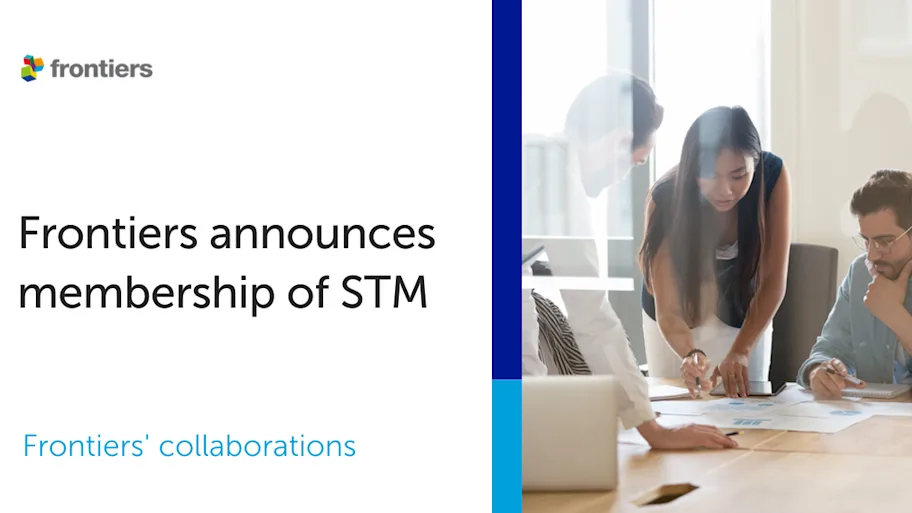
- Science news
- Institutional partnerships
- Accelerating open science: strengthening peer review with technology and institutional collaboration
Accelerating open science: strengthening peer review with technology and institutional collaboration

As we celebrate Peer Review Week 2024, we reflect on the core role peer review plays in ensuring the quality and integrity of research. At Frontiers, we see peer review as more than just a gatekeeping mechanism; it’s a constructive process central to our mission of advancing knowledge for the public good.
A community-centric approach
Our journals, specialty sections, and Research Topics are communities led by experts in their fields. Using AI and automation, we have created an efficient and equitable system to serve those communities, prioritizing expert evaluation. We have developed tools that support human judgment, not replace it, ensuring that the core value of peer review – rigorous assessment by subject matter experts – remains paramount.
Our process involves:
careful selection of reviewers: We match reviewers with submissions based on expertise and alignment with the journal’s scope, ensuring a fair and thorough evaluation.
transparent guidelines: Clear expectations for reviewers and authors promote efficiency and transparency throughout the process.
timely feedback: We prioritize prompt review turnaround times to minimize delays in the research lifecycle.
constructive criticism: Our reviewers are encouraged to provide detailed and actionable feedback to help authors improve their work.
Our peer review model creates a constructive environment where reviewers and authors work together to enhance and safeguard the quality of the research.
Innovation and technology in peer-review
Technology is offering unprecedented opportunities for researchers and institutions. By optimizing workflows, fostering collaboration, and accelerating time to publication, these advancements are transforming the way research is assessed and disseminated. Researchers benefit from accelerated feedback cycles, access to a broader spectrum of reviewers, and the ability to participate in more dynamic and transparent review processes. Innovative tools can also help identify potential research gaps, cultivate interdisciplinary collaboration, and propel scientific discovery.
In 2020, Frontiers launched AIRA, our artificial intelligence review assistant, making it possible for our peer review to be both efficient and thorough, essential requirements for quality at scale. Completely custom-built, we invest in development every year, turning AIRA into an ever more powerful and effective tool. It helps editors and reviewers evaluate manuscripts by making quality recommendations in seconds.
From an institutional standpoint, technology-driven peer review increases efficiency and cost-effectiveness and improves decision-making capabilities. By leveraging advanced analytics, institutions can acquire valuable insights into reviewer performance, publication trends, and overall research productivity.
These advancements ensure adherence to research integrity standards and streamline data management and sharing. Investing in cutting-edge peer review solutions empowers institutions to effectively support their researchers and contribute to more open and transparent research.
Institutional open access agreements
Institutional open access agreements are essential in creating a more efficient and equitable academic ecosystem. By covering article processing charges (APCs), our partnerships alleviate potential financial burdens on researchers, allowing them to focus on their research rather than funding concerns. This can lead to increased submission rates and faster turnaround times for peer review.
Moreover, institutional partnerships can foster a more supportive environment for peer review. When researchers are not preoccupied with financial constraints, they are more likely to engage constructively with the review process, leading to higher-quality feedback and improved manuscripts.
In essence, OA agreements create a virtuous cycle: by supporting researchers and institutions, they indirectly enhance the quality and speed of peer review. This alignment between open access and peer review is essential for building a sustainable and fair scholarly landscape.
Building a sustainable future for open access
At Frontiers, we are building a future where research is truly open, accessible, and driven by researchers' needs.
As a leading academic publisher, we're committed to research integrity. We actively participate in industry initiatives like the STM Integrity Hub and United2Act to combat fraudulent activity. Additionally, we've pioneered rigorous quality checks, totaling over 50 checks for author identity, manuscript quality, review quality, and article production.
As we navigate the complexities of the evolving academic landscape, we must harness the power of technology while preserving the core values of peer review: rigor, fairness, and transparency. Fostering a collaborative environment that blends human expertise with AI-driven insights can create a more efficient, inclusive, and trustworthy peer review process.
We invite librarians and institutional representatives to join us in our mission. By working together, publishers, institutions, and researchers can create a space where peer review is not just a necessary step but a collaborative process that drives research excellence and accelerates knowledge dissemination.
We also encourage you to think about ways to strengthen collaboration further and the steps we can take to ensure that the benefits of open access reach all members of the academic community.
Discover how Frontiers is leading the way in open access and peer review by exploring our latest metrics and policies.
About Frontiers
Frontiers is a leading research publisher. Our role is to provide the world’s scientists with a rigorous and efficient publishing experience. Powered by custom-built technology, artificial intelligence, and a collaborative peer review, our community journals give experts in more than 1,800 academic fields an open access platform to publish high quality, high impact research.
For more information on our open access agreements and institutional partnerships, visit our website or contact us.






